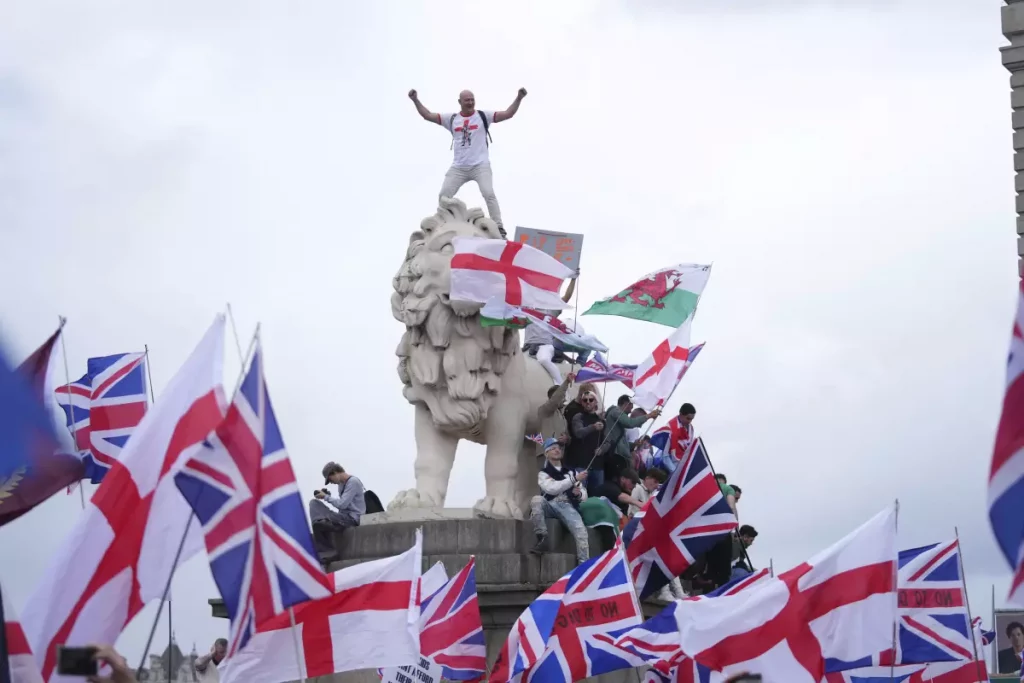British Prime Minister Keir Starmer has strongly condemned what he described as “dangerous” remarks made by Elon Musk during a mass anti-migrant demonstration in London. The owner of X and Tesla appeared by video link at the far-right rally and told protesters that “violence is coming” and that they must “fight back or die.”
The rally, named “Unite the Kingdom,” drew more than 100,000 people to central London on Saturday and was led by far-right activist Tommy Robinson. Though most attendees remained peaceful, police said violence broke out when a group of protesters clashed with officers. Twenty-six police officers were injured, four seriously, and 25 arrests were made, with the Metropolitan Police warning that more arrests are expected.
Musk’s call for the dissolution of Parliament and an early election angered political leaders across the spectrum, with critics accusing him of inciting unrest and interfering in British democracy. Starmer’s spokesman Dave Pares said the prime minister believed “the British public will have no truck with that kind of language.” He stressed that the UK is “a fair, tolerant and decent country” and that the government rejects inflammatory rhetoric that fuels intimidation on the streets.
Opposition leaders demanded stronger action. Ed Davey, leader of the Liberal Democrats, urged the government to sanction Musk and block Tesla from receiving public contracts. He called on Starmer, Conservative leader Kemi Badenoch, and Reform UK’s Nigel Farage to unite in condemning Musk’s comments as an attempt to “sow discord and incite violence.” However, Downing Street confirmed there are no current plans to sanction Musk.
This is not the first time Musk has aligned himself with far-right figures in Europe. He has previously supported Robinson, whose real name is Stephen Yaxley-Lennon, as well as Germany’s hard-right Alternative for Germany (AfD) party. Musk has also clashed with European governments, criticizing regulations designed to limit harmful online content, which he argues restrict freedom of speech.
Saturday’s rally was promoted as a free speech protest, but speeches from far-right politicians and online influencers focused heavily on the dangers of migration. The event came amid mounting political debate about irregular migration, especially the thousands of small boat arrivals across the English Channel. More than 30,000 people have made the journey so far this year despite efforts by British and French authorities to disrupt smuggling networks.
The government’s use of hotels to house asylum seekers has added to political tensions, sparking a series of smaller protests across the UK in recent months. Some of these demonstrations turned violent, fueling fears of rising hostility toward migrants. Flags, particularly the Union Jack and the red-and-white St. George’s Cross, were widely displayed at Saturday’s march. While often symbols of national pride, they have also been adopted by far-right groups in anti-migrant protests, raising concerns about intimidation toward ethnic minorities.
Analysts warn that symbols like flags are increasingly being used in divisive ways. Sunder Katwala of the think tank British Future said, “Flags can unite and divide as they are flown by people with different motives and meanings.” James Freeman, a political historian at the University of Bristol, added that using flags to “demark certain areas as out of bounds” has historical precedents, though the association of the St. George’s Cross with the far right is relatively recent.
Starmer, while supportive of the use of flags as symbols of unity, made clear that they should not be hijacked by extremists. In a post on X, he wrote: “Britain is a nation proudly built on tolerance, diversity and respect. Our flag represents our diverse country, and we will never surrender it to those who use it as a symbol of violence, fear and division.”

